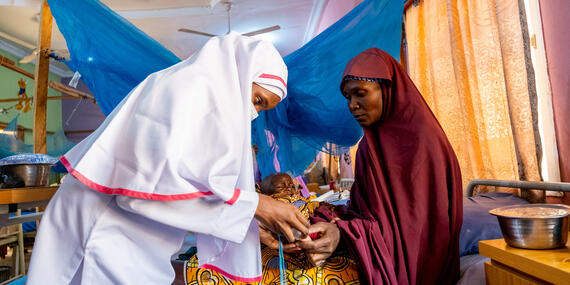Today's top news: Occupied Palestinian Territory, Haiti, Nigeria, Ukraine, ECOSOC HAS

Occupied Palestinian Territory
OCHA says that access constraints, security concerns and the breakdown of public order and safety continue to hamper the delivery of essential humanitarian assistance, affecting hundreds of thousands of people in need in Gaza.
OCHA also flags that persistent fuel shortages continue to hinder aid operations and the functioning of critical water, sanitation, health and other facilities across the Gaza Strip. Since the beginning of this year, the amount of diesel and benzene fuel entering Gaza on a monthly basis is just 14 per cent of levels prior to October 2023 – that’s 2 million litres compared to the 14 million litres that used to enter Gaza.
On Sunday the Director of the Kuwait Field Hospital in Khan Younis said that its main electricity generator had stopped functioning due to the lack of fuel and the facility was now relying on a secondary generator to maintain operations.
Health partners report that given the critical situation in Gaza, their focus continues to be on lifesaving and limb-saving operations. However, there are currently no conditions in place to bring in protheses or deploy specialized medical teams to assist amputees – many of whom are children and adolescents – in the rehabilitation process.
Meanwhile, United Nations Relief and Works Agency for Palestine Refugees in the near east reported that a school in northern Gaza was hit last night, reportedly killing 12 people and injuring 22 others.
Haiti
The resumption of flights at the airport in Haiti's Port-au-Prince since May has allowed aid organizations to airlift medicines, goods and other equipment critical to emergency operations.
On 21 June, the NGO Médecins Sans Frontières airlifted 80 tons of medicine and equipment for its operations in Port-au-Prince.
Since last month, the World Food Programme (WFP) operated four cargo flights to service its own operations and partners, including medicine, medical equipment and supplies to be prepositioned for the ongoing hurricane season.
WFP started to transition from distributing hot meals to providing cash to thousands of families living in displacement sites in the Port-au-Prince metropolitan area.
WFP has distributed more than 1.25 million hot meals to nearly 129,000 internally displaced people in 97 sites in the Port-au-Prince metropolitan area, since the beginning of the year.
Despite aid organizations scaling up their operations, humanitarian needs remain high in the capital and across the country.
UNICEF says it is concerned about the living conditions of some 33,000 people who have displaced from the capital Port-au-Port to Leogane, a city in the south.
Some 5.5 million people need humanitarian aid and 578,000 people are displaced across the country.
The US$674 million Humanitarian Response Plan is 23.5 per cent funded, with $158 million received.
Nigeria
OCHA is alarmed by rising malnutrition levels in Nigeria's north-east. Nearly a quarter of a million children – some 230,000 – are estimated to be at risk of severe acute malnutrition during the current lean season in Borno, Adamawa and Yobe states.
OCHA stresses the need for urgent funding to enable early action and a swift response to the crisis.
To that end, Emergency Relief Coordinator Martin Griffiths has allocated US$11 million from the Central Emergency Response Fund to support the provision of cash and other assistance – including treatment for acutely malnourished children – for the most vulnerable households. An additional $11 million for the response will come from the Nigeria Humanitarian Fund.
North-east Nigeria has seen a rapid increase in severe acute malnutrition this year, with admissions to stabilization centres exceeding 2023 levels by more than 50 per cent – the highest level on record.
This has exhausted existing supplies – and the lack of resources could force many stabilization centres to close. The new allocations from CERF and the Nigeria Humanitarian Fund will help address the crisis in the short term, but additional funding is urgently needed to maintain response efforts through September, when the lean seasons ends.
Meanwhile, the 2024 humanitarian appeal for Nigeria remains severely under-sourced. Nearly halfway into the year, the response plan is just over 20 per cent funded, with roughly $190 million received of the nearly $927 million required.
Ukraine
The UN and partners continue to provide emergency response across Ukraine.
The town of Pokrovsk in the Donetsk Region sustained another deadly attack on 24 June. According to authorities, more than 40 civilians, including 3 children, were killed or injured in the attack, which also caused extensive damage to homes and other civilian facilities.
A health NGO provided medical assistance to about a dozen civilians who sustained severe injuries and transported two patients, including an injured 11-year-old child, from Pokrovsk to Dnipro City for specialized care by ambulance.
The response continues today, with aid organizations delivering material to cover repair damages to houses.
Furthermore, over the last few days, aid organizations continued to provide emergency assistance in Odesa City and in the western regions of Ivano-Frankivsk, Lviv and Volyn following latest strikes across the country.
ECOSOC HAS
The ECOSOC Humanitarian Affairs Segment began today in New York.
Speaking at the opening session, the Assistant Secretary-General for Humanitarian Affairs, Joyce Msuya, warned that humanitarian emergencies are growing more frequent, complex, entangled and longer lasting than ever.
She stressed that to address crises fueled by conflict and climate change – as well as improve the way aid is delivered – the global humanitarian system must put humanity first.
This year’s Humanitarian Affairs Segment, which runs through Thursday, brings together Member States, UN officials, and humanitarian, development and private sector partners. Their discussions will focus on four main themes: the erosion of respect for international humanitarian law; the impact of climate change on humanitarian emergencies; the potential for innovation and new technologies; and the need to put women and girls at the centre of humanitarian action.
